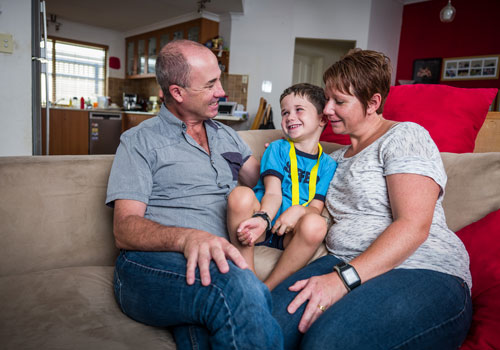When Jodie and Brad Scott welcomed their fourth child Heath into the world, they were prepared for the many sleepless nights that come with caring for a newborn.
What they did not expect, was that five years later they would still be waking up three times a night to check on their son.
“You go to bed at night time thinking when I get up in the morning is Heath still going to be alive? It is something that just plays on your mind,” Brad said.
Heath was diagnosed with type 1 diabetes when he was three years old after he lost a dramatic amount of weight in a short period of time.
Since then, his parents have had to give their son round the clock care in order to keep his blood glucose levels within a healthy range.
If they fall too low, Heath could fall into a diabetic coma.
“We test him before he has dinner, we test him again at 10pm, quite often I’m up a 1am testing him, at times it’s another 4am test,” Brad said.

“If you think back to the times you’ve had a newborn baby and you’re up every two hours doing a feed - the impacts it has on your body. A baby grows out of that, a diabetic doesn’t.”
Along with the late night checks, Jodie and Brad have to count the carbohydrates Heath eats at every meal and then use a mathematical formula to determine how much insulin he needs to be injected with.
“The idea of deliberately hurting your child because you need to keep them alive, it’s a hard thing to process and it’s a hard thing to come to terms with,” said Jodie.
“Every time I did them, it hurt him and it’s not why I’m here.”
The often sleep deprived parents also live in fear they will get the dosage of insulin wrong.
“It is a life threatening disease, you’re actually treating your child with basically something that can kill them. You get the dose too high you could actually kill your child,” said Brad.
They also worry about the long term health effects of diabetes.
As he ages, Heath is at greater risk of developing complications such as eye disease, heart disease and stroke.
“One of the hardest things for me to hear recently, was Heath saying ‘I can’t wait until I get bigger and I grow up because then I will be like the boys and I won’t have diabetes’,” said Jodie.
“Having to explain to a child that this is their life, makes it really hard.”
Both Jodie and Brad hope research will not only provide better treatment options for their son, but also one day a cure.
“Anything that helps in any way, either from knowing how it occurred, to why it occurred, and if we can stop that in future generations, that would be fantastic, to not have kids being diagnosed with this anymore,” said Jodie.
“We deal with what we deal with now but I’d love him to have the chance to have a normal childhood, just be a kid,” said Brad.
